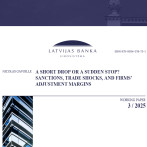Economic outlook for 2013
The turn of the year is the right time for taking a look at the accomplishments of the previous year and the future prospects. In this article I would like to provide my assessment of the economic developments in 2012 as well forecasts for 2013.
We did it
Looking back at 2012, we could say that Latvia "knocked out" several world famous economists and theoreticians. The grim predictions by Paul Krugman, Nouriel Roubini and Lars Christensen about Latvia falling into the abyss have not come true. Latvia managed to retain a fixed exchange rate during the crisis, something no other country had been able to do so far. Moreover, Latvia outperformed the cautious growth forecasts for 2012, released by the government at the beginning of the year, with the economic growth exceeding 5% instead of the expected 1%–2%. Today Latvia is the fastest growing economy in the EU, holding the first place in the EU regarding the pace of job creation. Industrial output and export volumes have already exceeded the pre-crisis levels. Also, people have almost stopped leaving the country in search of better remuneration.
Some problems remain
However, there are still some problems which have not been solved yet and cause concern. First of all, it is the high unemployment rate (although 13.5% according to the Eurostat methodology is almost twice lower than that of Greece and Spain, it is indeed too high), as well as the social inequality. It should be noted though that a high unemployment rate has been typical for Latvia throughout the period after the restoration of independence, and during the last eight years (i.e. also during the economic boom) it has been higher than in its neighbouring countries Estonia and Lithuania. It is an important issue, and an in-depth study should be carried out.
But the toughest times are over
The toughest times for Latvia are over. It was confirmed by the high appreciation expressed by Olivier Blanchard, the Chief Economist of the International Monetary Fund, in June 2012 regarding the accomplishments of Latvia. He admitted that four years ago he had not believed we would manage to overcome the crisis without changes in the lats exchange rate. It is more common to receive compliments from politicians but to hear words of praise from an economist of this rank was a positive surprise.
Towards the two important memberships
And now let us look at Latvia's prospects for 2013. Providing economic forecasts is an unglamorous task because, firstly, the future is not written in the stars – we make it ourselves. Secondly, more and more radical and even apocalyptic predictions have been voiced recently, ruining any effort to assess the potential developments objectively.
We can expect the growth of Latvia’s economy to slow down this year, nevertheless still remaining among the most accelerated in Europe. The average income level will slowly but persistently approach the EU average (our income is currently 60% of the EU average, compared with 30% in 1995).
Average wages are expected to reach the pre-crisis level in 2013 (500 lats or 711 euro per month before taxes). In Riga wages will traditionally be 15% higher. Significant job market fragmentation will still persist depending on the level of qualification. The very high demand for skilled labour will bring along considerably better remuneration while unqualified staff and unskilled workers will not do so well.
If there are no surprises, Latvia will meet all Maastricht criteria, receive an invitation to join the euro area and take another step towards joining the OECD, also known as the world’s “golden billion” club. Estonia managed to join the OECD in the same year when the invitation to join the euro area was received, and the OECD membership means being among the most developed countries of the world.
We can look forward to the future with optimism; however, let us remember that we are the ones who create the future. Consequently, the better we work today, the better our life will be tomorrow.
Textual error
«… …»






